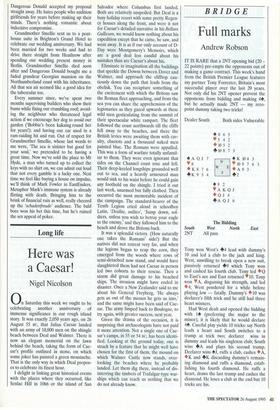Long life
Here was a Caesar!
Nigel Nicolson
On Saturday this week we ought to be celebrating another anniversary of immense significance in our rough island story. It was exactly 2,050 years ago, on 26 August 55 BC, that Julius Caesar landed with an army of 10,000 men on the shingle beach between Deal and Walmer. There is now an elegant memorial on the lawn behind the beach, taking the form of Cae- sar's profile outlined in stone, on which some joker has painted a green moustache. That is the only way in which Deal propos- es to celebrate its finest hour.
I delight in linking great historical events with the places where they occurred, like Senlac Hill in 1066 or the island of San Salvador where Columbus first landed.
Both are relatively unspoiled. But Deal is a busy holiday resort with some pretty Regen- cy houses along the front, and were it not for Caesar's detailed narrative in his Bellum Gallicum, we would know nothing about his expedition except that he came, he saw, and went away. It is as if our only account of D- Day were Montgomery's Memoirs, which are a good deal less candid about his mistakes than are Caesar's about his.
Eliminate in imagination all the buildings that speckle the Downs between Dover and Walmer, and approach the clifftop cau- tiously down the path that leads from the obelisk. You can recapture something of the excitement with which the Britons saw the Roman fleet approaching, and from the sea you can share the apprehension of the legionaries as they gazed upwards at these wild men gesticulating from the summit of their spectacular white rampart. The fleet followed the coast northwards till the cliffs fell away to the beaches, and there the British levies were awaiting them with cav- alry, chariots and a thousand naked men painted blue. The Romans were appalled. This was a form of warfare totally unfamil- iar to them. They were even ignorant that tides on the Channel coast rose and fell. Their deep-keeled longships grounded well out to sea, and a heavily armoured man would sink to his waist before he could gain any foothold on the shingle. I tried it out last week, unarmed but fully clothed. Then occurred the most memorable incident of the campaign. The standard-bearer of the Tenth Legion cried aloud in schoolboy Latin, Desilite, mutes', 'Jump down, sol- diers, unless you wish to betray your eagle to the enemy,' and they followed him to the beach and drove the Britons back.
It was a splendid victory. (How naturally one takes the Romans' side!) But the natives did not retreat very far, and when the legions began to reap the corn, they emerged from the woods where rows of semi-detached now stand, and would have slaughtered them had not Caesar in person led two cohorts to their rescue. Then a storm did great damage to his beached ships. The invasion might have ended in disaster. Once a New Zealander said to me about his General Freyberg, 'He always gets us out of the messes he gets us into,' and the same might have been said of Cae- sar. The army limped back to Boulogne, to try again, with greater success, next year.
Given the drama of the occasion, it is surprising that archaeologists have not paid it more attention. Not a single one of Cae- sar's camps, in 55 or 54 BC, has been identi- fied. Looking at the ground today, one is struck by a feature that he might well have chosen for the first of them, the mound on which Walmer Castle now stands, over- looking the beaches where he probably landed. Let them dig there, instead of dis- interring the timbers of Trafalgar-type war- ships which can teach us nothing that we do not already know.


















































 Previous page
Previous page